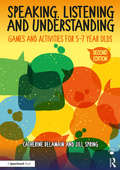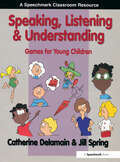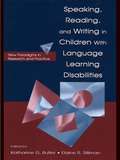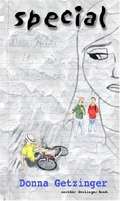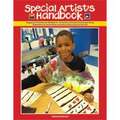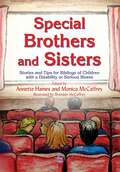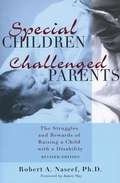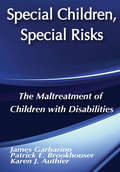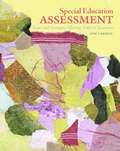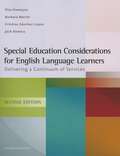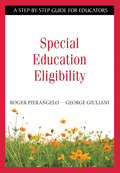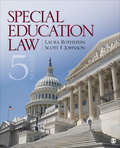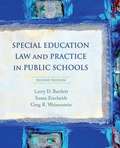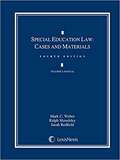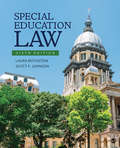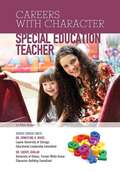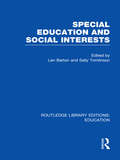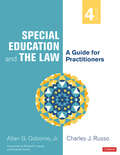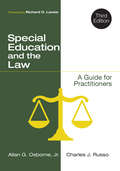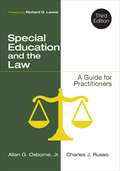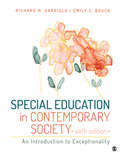- Table View
- List View
Speaking, Listening and Understanding: Games and Activities for 5-7 year olds (The Good Communication Pathway)
by Catherine Delamain Jill SpringSpeaking, Listening and Understanding is a practical resource packed full of games to improve young children’s communication skills. The second edition of this bestselling resource contains a programme of games and activities to foster the speaking, listening and understanding skills of children aged from 5 to 7 years. The book seeks to address language and communication difficulties for primary-aged children by providing a range of fun and engaging activities. Suitable for whole classes or small groups of children, the activities focus on both understanding and using language in areas such as following instructions, thinking skills, inference, describing, narrating and playing with words. Features include: 160 games and activities which are differentiated by stages and levels of ability; A clear aim, equipment list and instructions for each activity; Photocopiable templates for ease of use; Supplementary resource sheets including pictures and scripts to use with the activities. Now fully revised and updated in line with current policy and legislation, this book is suitable for young children in any school setting. It also includes material that may be used as an effective part of a speech and language therapy programme in consultation with a therapist. This is a unique manual that will be an essential addition to the materials used by professionals working with young children.
Speaking, Listening and Understanding: Games for Young Children (The\good Communication Pathway Ser.)
by Catherine Delamain Jill SpringWritten by two experienced speech language therapists, who have worked extensively alongside mainstream teachers, this book provides activities that are both teacher and child friendly. It contains a collection of graded games and activities designed to foster the speaking, listening and understanding skills of children aged from 5 to 7. The activities are divided into two main areas: Understanding Spoken Language: Following Instructions; Getting the Main Idea; Thinking Skills; Developing Vocabulary; Understanding Inference. Using Spoken Language: Narrating; Describing; Explaining; Predicting; Playing with Words. Each activity has a clear aim, simple instructions, and requires minimal equipment. Activities may be carried out by teachers, classroom assistants or volunteers. Incorporates user-friendly opportunities for assessment, target setting and evaluation. Includes photocopiable material to support the activities. "Many of the activities can be used by speech language therapists, and the book can be used as an effective part of a speech and language programme. Promotes the skills outlined in Speaking and Listening in the English National Curriculum Key Stage One.
Speaking, Reading, and Writing in Children With Language Learning Disabilities: New Paradigms in Research and Practice
by Elaine R. Silliman Katharine G. ButlerThe ability to use language in more literate ways has always been a central outcome of education. Today, however, "being literate" requires more than functional literacy, the recognition of printed words as meaningful. It requires the knowledge of how to use language as a tool for analyzing, synthesizing, and integrating what is heard or read in order to arrive at new interpretations. Specialists in education, cognitive psychology, learning disabilities, communication sciences and disorders, and other fields have studied the language learning problems of school age children from their own perspectives. All have tended to emphasize either the oral language component or phonemic awareness. The major influence of phonemic awareness on learning to read and spell is well-researched, but it is not the only relevant focus for efforts in intervention and instruction. An issue is that applications are usually the products of a single discipline or profession, and few integrate an understanding of phonemic awareness with an understanding of the ways in which oral language comprehension and expression support reading, writing, and spelling. Thus, what we have learned about language remains disconnected from what we have learned about literacy; interrelationships between language and literacy are not appreciated; and educational services for students with language and learning disabilities are fragmented as a result. This unique book, a multidisciplinary collaboration, bridges research, practice, and the development of new technologies. It offers the first comprehensive and integrated overview of the multiple factors involved in language learning from late preschool through post high school that must be considered if problems are to be effectively addressed. Practitioners, researchers, and students professionally concerned with these problems will find the book an invaluable resource.
Special
by Donna GetzingerSpecial is based on Getzinger's own experiences as the younger sister of a Learning Disabled boy. This story is very close to her heart, and she hopes that everyone who reads this book will learn to love and accept the unique-ness of people like her brother the way that she has.
Special Artist's Handbook: Engaging Art Activities For Special Needs Including Autism Spectrum Disorder, Second Edition
by Susan RodriguezThe Special Artist's Handbook is an art activities reference manual for art teachers, special education teachers, art teachers, classroom teachers, recreational therapists, parents, and anyone who is involved with the education of exceptional children.
Special Brothers and Sisters: Stories and Tips for Siblings of Children with Special Needs, Disability or Serious Illness
by Annette Hames Monica MccaffreySpecial Brothers and Sisters is a collection of real-life accounts from the brothers and sisters of children with special needs, disability or serious illness, ranging in age from 3 to 18 years. They explain, in their own words, what it's like to live with their siblings. There is a lot of advice available for parents of a child with a disability or illness, but very little about the important issue of educating their siblings about how they feel, and why they may behave differently from other children. These stories - from 40 different families - come with related tips to help siblings deal with some of the things that happen in their family lives. The book also provides a helpful glossary to explain, in child-friendly language, the disabilities and medical conditions mentioned, including: * ADHD * autism * cerebral palsy * cystic fibrosis * Down syndrome Special Brothers and Sisters is an engaging and educational collection that will enable young people and adults to share in the extraordinary experience of being a sibling of a child with special needs, a disability or serious illness.
Special Children, Challenged Parents: The Struggles and Rewards of Raising a Child with a Disability
by Robert NaseefRaising children with special health care or developmental needs is uniquely so. At times, the challenges seem overwhelming and even oppressive.
Special Children, Special Risks: The Maltreatment of Children with Disabilities (Modern Applications Of Social Work Ser.)
by James Garbarino Patrick E. Brookhouser Karen J. AuthierHow does one investigate a child maltreatment case when the victim is blind, mute, deaf, mentally retarded, or confined to an institution? Special Children, Special Risks presents analysis, recommendations, and related research from social work, psychology, psychiatry, medicine, and education essential for establishing and maintaining safe environments for handicapped children.This book brings together a diverse group of experts to pool their knowledge and share their concerns about the risks of abuse faced by handicapped children. The contributors' perspectives come from the fields of medicine, social work, developmental psychology, psychiatry, clinical psychology, education, child welfare, law, public policy, and journalism.
Special Education Advocacy
by Ruth Colker Julie K. WaterstoneAn edition that uses the advocacy approach to develop a set of materials of teaching children in the special education sector. This book presents the major principles to successful advocacy on behalf of special needs children by using meaningful real life experience.
Special Education Assessment: Issues and Strategies Affecting Today's Classrooms
by Effie KritikosWith a strong emphasis on diversity, this robust and practical book offers current teachers and pre-service teachers alike an eye-opening and clear exploration of current formal and informal assessment tool analysis with respect to accommodations, modifications, legal and technology matters. Real-life case studies are incorporated into each chapter, helping readers to hone their decision-making skills and to understand how the chapter material relates to practical applications. At the same time, break point practices, illustrations of assessment tools, and website references provide students with multiple opportunities for self-assessment, higher-level analysis and classroom applications.
Special Education Considerations for English Language Learners: Delivering a Continuum of Services
by Else Hamayan Jack Damico Barbara MarlerThis important guide shows how to determine appropriate interventions for ELLs with academic challenges. It includes extensive new discussions of RtI and standardized testing used for diagnostic purposes and and reviews consequences for ELLs. The ensuring a continuum of services model featured in the book is a strong collaborative framework that takes teams of educators step-by-step through gathering information about and implementing effective interventions for ELLs with learning difficulties.
Special Education Eligibility: A Step-by-Step Guide for Educators
by Roger Pierangelo George A. GiulianiOffers clear guidelines aligned with the reauthorization of IDEA 2004 for assessing students' eligibility for special education services and for working with families and service providers.
Special Education Law
by Scott F. Johnson Professor Laura F. RothsteinSpecial Education Law, Fifth Edition provides a comprehensive, and student-friendly overview of the major federal laws—and judicial interpretations of those laws—that apply to the education of children with special needs. Laura Rothstein and Scott F. Johnson thoroughly present the most up-to-date information on special education statutes, regulations, and judicial interpretations, including substantial changes in the interpretation of the legistlation. The text helps students understand what the law requires so that they can develop policies and make decisions that comply with these laws.
Special Education Law and Practice in Public Schools
by Larry D. Bartlett Greg R. Weisenstein Susan EtscheidtA must have resource for school leaders and personnel, Special Education Law and Practice in Public Schools is dedicated to understanding the complex laws and issues surrounding students with special needs. Broad in coverage, it discusses current topics such as: the reauthorization of IDEA, NCLB, and 504; working with families; IEPs; assessment; staff relationships and staffing patters; due process hearing, mediation and complaints; school-wide discipline, and strategies for specific populations ( infant/toddler, preschool, secondary school, etc. ) Filled with ready-to-use samples and inclusion strategies, the book adheres to school administration and CEC standards and is a conclusive resource for practicing professionals.
Special Education Law: Cases and Materials
by Mark C. Weber Ralph Mawdsley Sarah RedfieldThis book contains relevant statutory excerpts and carefully edited reports of the leading special education cases, together with extensive explanatory materials and provocative questions for class discussion. <p><p> The book also features practical exercises for home assignments or in-class projects. Two of the co-authors teach in law schools and have deep experience in special education law as well as allied subjects such as constitutional law, administrative law, civil procedure, federal courts, and general school law. Their background enables them to discuss the special education topics thoroughly and to draw connections to other parts of the law school curriculum. The third co-author, who is also a lawyer, teaches educational administration as well as special education law; that background enables him to add lessons on the real-world impact of the law on the daily work of the schools. <p><p> The Fourth Edition includes new cases on eligibility, damages, and other topics, as well as coverage of the new Infant and Toddler Program regulations.
Special Education Law: Rothstein, Special Education Law, Fourth Edition + Osborne, Special Education And The Law: A Guide For Practitioners, Second Edition
by Scott F. Johnson Professor Laura F. RothsteinSpecial Education Law 6e, written by Laura Rothstein and Scott F. Johnson, provides a comprehensive and current overview of the major federal law, and judicial interpretations of those laws, that apply to special education students. School administrators and attorneys attend to special education issues on a regular basis, and local superintendents, principals, special education professionals, psychologists, and regional and state administrators must also be familiar with the legal requirements of educating students with disabilities. Classroom teachers in all types of classrooms need to be aware of the laws that affect them and their students. Special Education Law 6e is intended for students in education and educational administration, both graduate and undergraduate, as well as law students in courses on special education law, school law, and special education. The framework of this book begins with five introductory chapters on the major issues that are addressed in special education law. These topics include an overview the legal system, the history of special education, major statutes in special education law, stakeholders such as students, families, educators, and advocates, and finally, requirements for protection under various special education laws. The remainder of the text presents and analyzes special education case law within specific contexts. The text helps educators understand what the law requires so that they can make decisions that comply with these laws. Updates for the sixth edition include a major reorganization of the text. Chapters have been streamlined and edited for clarity, combining a previous chapter on Related Services with Free Appropriate Publication Education, and folding Eligibility into Identification, Evaluation, and Eligibility, so students can better see the connections between these topics. Many case excerpts have been shortened or summarized to provide students with a more straightforward and focused reading experience. The latest updates in statutes, regulations, and case law are included throughout the text.
Special Education Law: Rothstein, Special Education Law, Fourth Edition + Osborne, Special Education And The Law: A Guide For Practitioners, Second Edition
by Scott F. Johnson Professor Laura F. RothsteinSpecial Education Law 6e, written by Laura Rothstein and Scott F. Johnson, provides a comprehensive and current overview of the major federal law, and judicial interpretations of those laws, that apply to special education students. School administrators and attorneys attend to special education issues on a regular basis, and local superintendents, principals, special education professionals, psychologists, and regional and state administrators must also be familiar with the legal requirements of educating students with disabilities. Classroom teachers in all types of classrooms need to be aware of the laws that affect them and their students. Special Education Law 6e is intended for students in education and educational administration, both graduate and undergraduate, as well as law students in courses on special education law, school law, and special education. The framework of this book begins with five introductory chapters on the major issues that are addressed in special education law. These topics include an overview the legal system, the history of special education, major statutes in special education law, stakeholders such as students, families, educators, and advocates, and finally, requirements for protection under various special education laws. The remainder of the text presents and analyzes special education case law within specific contexts. The text helps educators understand what the law requires so that they can make decisions that comply with these laws. Updates for the sixth edition include a major reorganization of the text. Chapters have been streamlined and edited for clarity, combining a previous chapter on Related Services with Free Appropriate Publication Education, and folding Eligibility into Identification, Evaluation, and Eligibility, so students can better see the connections between these topics. Many case excerpts have been shortened or summarized to provide students with a more straightforward and focused reading experience. The latest updates in statutes, regulations, and case law are included throughout the text.
Special Education Teacher (Careers With Character #18)
by Ellyn SannaFind out what it takes to be a special education teacher with character... Special education teachers work with students who have one of these disabilities: *Speech or language impairments; *Mental retardation; *Emotional disturbance; *Learning disabilities; *Hearing impairments; *Visual impairments; *Autism; *Deaf-blindness; or *Multiple disabilities and other health impairments. If you think you might want to work with students who have disabilities like these, you'll need education and experience--but you will also need the qualities of a good character. Special education teachers with character have... The respect and compassion that will build children's self-esteem... The responsibility to teach students the skills they'll need to move toward independence... The courage to stand up for those who have often been rejected... And the diligence to keep going, one small step after another, so that one day students will look back and be amazed by how far they've come. Special education teachers make a difference in children's lives! This volume of Careers with Characters will show you how.
Special Education and Social Interests (Routledge Library Editions: Education)
by Len Barton Sally TomlinsonUntil this book was published, most writing on special education was about specific disabilities and how to cope with them. This book, however, considers the broader context, looking at many problems for the wider system that have arisen through integration of special education within it. The book is international and comparative in its focus and includes much North American material and work by North American researchers.
Special Education and the Law: A Guide for Practitioners
by Allan G. Osborne Charles RussoThe essential resource for success in special education Educators face major challenges when addressing the needs of students with disabilities. This includes understanding a complex legal field: special education law. Special Education and the Law, Fourth Edition: A Guide for Practitioners is the ultimate for busy educators. Osborne and Russo, past presidents of the Educational Law Association, are experts in translating legalese into language that educators can understand. They have created a resource that examines legislation and interprets the statutes and their regulations in a reader-friendly format. Major topics include rights of access to public education, procedural due process, placement requirements, delivery of related services, discipline of students with disabilities, and remedies for failure to adhere to the law. With a preventative approach to litigation that separates it from other publications, this book features: • Updates on legal developments from the almost-1000 federal and state cases decided since publication of the third edition in 2014 • Coverage of IDEA, ADA, FAPE, 504, discipline, IEPs, LRE, parental considerations, public vs. private school considerations, and attorney fees • A focus on federal and state interpretations With its user-friendly format, this resource will help educators focus on their core competency: providing exemplary education to students with special needs.
Special Education and the Law: A Guide for Practitioners
by Allan G. Osborne Charles RussoThe essential resource for success in special education Educators face major challenges when addressing the needs of students with disabilities. This includes understanding a complex legal field: special education law. Special Education and the Law, Fourth Edition: A Guide for Practitioners is the ultimate for busy educators. Osborne and Russo, past presidents of the Educational Law Association, are experts in translating legalese into language that educators can understand. They have created a resource that examines legislation and interprets the statutes and their regulations in a reader-friendly format. Major topics include rights of access to public education, procedural due process, placement requirements, delivery of related services, discipline of students with disabilities, and remedies for failure to adhere to the law. With a preventative approach to litigation that separates it from other publications, this book features: • Updates on legal developments from the almost-1000 federal and state cases decided since publication of the third edition in 2014 • Coverage of IDEA, ADA, FAPE, 504, discipline, IEPs, LRE, parental considerations, public vs. private school considerations, and attorney fees • A focus on federal and state interpretations With its user-friendly format, this resource will help educators focus on their core competency: providing exemplary education to students with special needs.
Special Education and the Law: A Guide for Practitioners
by Dr Allan G. Osborne Dr Charles J. RussoThe ultimate resource for success in special education—newly updated! Authored by two past presidents of the Educational Law Association, this essential guide translates legalese into your language and allows you to focus on your core competency: providing excellent education for students with special needs. Updated to reflect significant court decisions and new developments, the book features: Extensive coverage of IDEA’s reauthorization, Section 504 and the ADA, and FAPE and LRE New analysis of parent and student rights Guidance on discipline A preventative approach to special education litigation Focus on federal and state interpretations of the law
Special Education and the Law: A Guide for Practitioners (Third Edition)
by Allan G. Osborne Charles J. RussoThis essential guide translates legalese into your language and allows the special education teacher to focus on your core competency: providing excellent education for students with special needs.
Special Education in Contemporary Society: An Introduction to Exceptionality
by Richard M. Gargiulo Emily C. Bouck2015 Recipient of the Textbook Excellence Award from the Text and Academic Authors Association (TAA) The Sixth Edition of Richard Gargiulo’s well-respected Special Education in Contemporary Society: An Introduction to Exceptionality offers a comprehensive, engaging, and easy-to-read introduction to special education. Grounded in research and updated to reflect the most current thinking and standards of the field, the book provides students with the skills and knowledge to become successful teachers. Richard Gargiulo and new co-author Emily Bouck encourage a deep awareness and understanding of the human side of special education. Their book provides students a rare look into the lives of exceptional students and their families, as well as the teachers that work with exceptional persons throughout their lives. The new edition maintains the broad context and research focus for which the book is known, while expanding on current trends and contemporary issues to better serve both pre-service and in-service teachers of exceptional individuals. The text is organized into two distinct parts to offer students a truly comprehensive and humane understanding of exceptionality. In Part I, readers are provided strong foundational perspective on broad topics that affect all individuals with an exceptionality. In Part II, the authors engage students with thorough examinations of individual exceptionalities, and discuss historical, personal, and educational details of each exceptionality as it affects a person across the lifespan.
Special Education in Contemporary Society: An Introduction to Exceptionality
by Richard M. Gargiulo Emily C. Bouck2015 Recipient of the Textbook Excellence Award from the Text and Academic Authors Association (TAA) The Sixth Edition of Richard Gargiulo’s well-respected Special Education in Contemporary Society: An Introduction to Exceptionality offers a comprehensive, engaging, and easy-to-read introduction to special education. Grounded in research and updated to reflect the most current thinking and standards of the field, the book provides students with the skills and knowledge to become successful teachers. Richard Gargiulo and new co-author Emily Bouck encourage a deep awareness and understanding of the human side of special education. Their book provides students a rare look into the lives of exceptional students and their families, as well as the teachers that work with exceptional persons throughout their lives. The new edition maintains the broad context and research focus for which the book is known, while expanding on current trends and contemporary issues to better serve both pre-service and in-service teachers of exceptional individuals. The text is organized into two distinct parts to offer students a truly comprehensive and humane understanding of exceptionality. In Part I, readers are provided strong foundational perspective on broad topics that affect all individuals with an exceptionality. In Part II, the authors engage students with thorough examinations of individual exceptionalities, and discuss historical, personal, and educational details of each exceptionality as it affects a person across the lifespan.
